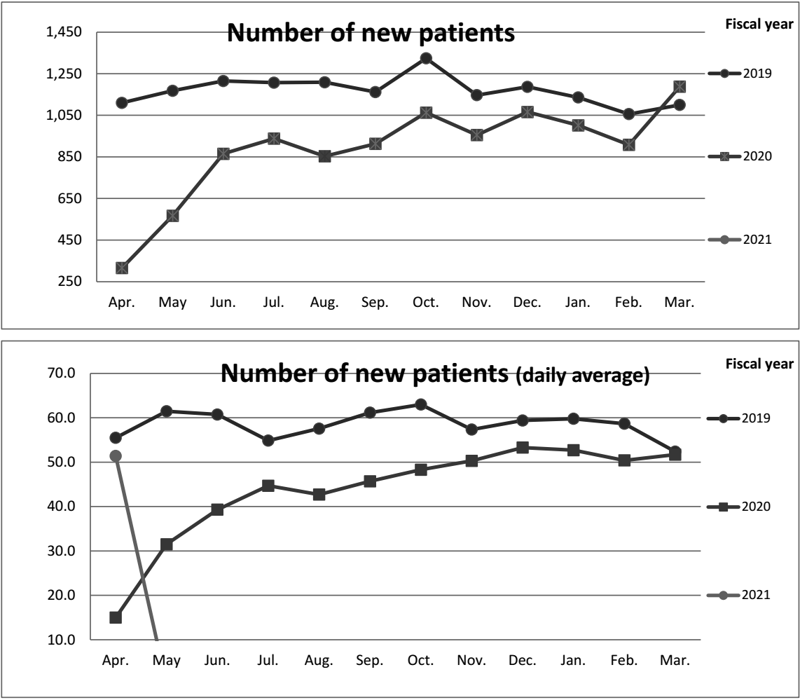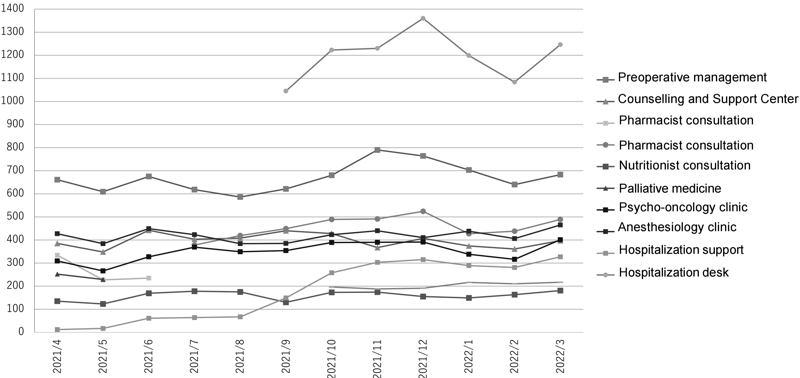Annual Report 2021
Patient Flow Support Center, Center for Physician Referral and Medical Social Service, Center for Patient Flow Management
Hiroyuki Fujimoto, Eriko Satomi, Satoru Iwasa, Hidehito Horinouchi, Shintaro Iwata, Ayako Mori, Emi Fujii, Takeyuki Wada, Sawako Kaku, Hiroko Sasaguchi, Kayoko Miyata, Natsuko Moroi, Rieko Shimizu, Naoko Matsunaga, Miho Koitabashi, Mariko Shimizu, Masako Yabumoto, Ryouko Maeda, Yukimi Ikeda, Daiki Murakami, Tomonori Koma, Reiko Hanada, Fumiko Onishi, Hiroko Sasaguchi, Asuka Kijima, Kiyomi Suzuki, Yukari Tokuhisa, Naoko Inamura, Narumi Katsumura, Mami Akutsu, Momoko Takahashi, Chihoko Nemoto, Chihiro Dei, Kurumi Jyo, Naoko Arii, Miwako Saito, Sayaka Jinno, Reiko Kojima, Sayaka Kurata, Kana Ineno, Mari Suzuki
Introduction
During the treatment and management of cancer patients, there are various unmet needs which cannot be solved by each patient just visiting a doctor; it is generally recognized that taking a team approach to these problems is very important. In September 2016, the Supportive Care Development Center was opened as the team medicine base in the National Cancer Center Hospital. We are supplying many kinds of support not only to patients but also to their families in collaboration with doctors and other team members consisting of many dedicated professionals. In 2021, the Supportive Care Development Center consisted of three subdivisions: the Center for Physician Referral and Medical Social Service, the Center for Patient Flow Management, and the Center for Supportive Care Service.
The Team and What We Do
Center for Physician Referral and Medical Social Service
The total number of new patients was 12,355 (Figure1).
In terms of consultation support services, the total number of face-to-face and telephone consultations was 17,048 (8,223 new consultation requests, of which 3,376 were for our hospital's patients and 4,847 were for other hospitals’ patients). We held 19 webinars on regional cooperation and 8 conferences on cooperation with medical institutions.
We work as a multidisciplinary team with physicians, nurses, medical social workers, and clinical psychologists, and provide the following services:
1. Consultation, counseling and support services
2. Group programs for patients and their families
3. Multi-departmental, multidisciplinary team support
4. Collaborative support with other hospitals and institutions
5. Providing information on cancer treatment through webinars
Figure 1. Number of new patients

Center for Patient Flow Management
The Center for Patient Flow Management was established to support cancer patients through appropriate patient flow management. The core missions of the Center for Patient Flow Management are as follows.
1) Patient flow management based on efficient arrangement of hospital beds in collaboration with medical departments and hospital wards managers.
2) Patient support through both pre-admission and post-discharge management.
Center for Supportive Care Service
The average number of patients in FY2021 increased to 180.1 patients/day as the hospitalization reception was moved to the Patient Support Center (Figure 2). The number of participants for the regular programs in FY2021 is shown in the Table 1. In addition to the above, we have been conducting several classes, including Adolescent & Young Adult Peer Support, Children and Parents Support, ones on nutrition, anti-cancer drugs, and pancreato-biliary cancer and on body image for breast cancer patients, ones on relaxation and lymphedema management, and ones for esophageal cancer patients.
Due to the COVID-19 pandemic, each class was held on a reservation basis and with a limited number of participants. Patient orientation was performed using pre-recorded movies in the perioperative and pre-hospitalization support unit.
In October 2021, the rare cancer hotline was transferred to the Consultation Support Center, and nurses, MSWs, and administrative staff are working together to provide telephone consultation services. The rare cancer hotline provides consultation services that make the most of its expertise in cooperation with various rare cancer specialists.
Figure 2. Changes in the number of regular program
participants

Research activities
Center for Physician Referral and Medical Social Service
For a research project titled "Support for Cancer Patients in the AYA to Middle Age Generation," we were in charge of support for work compatibility and promoted the construction of an online consultation system. The research was adopted by the Yuumi Memorial Foundation for Home Health Care for a grant as "Research on home care for cancer patients in the COVID-19 pandemic," and research has been initiated.
Center for Supportive Care Service
The reproductive support team examined support for patients with reproductive dysfunction due to cancer treatment.
In the perioperative support unit, we analyzed preoperative risks and predictive factors for prolonged hospitalization in elderly patients who received surgery for colorectal cancer.
We analyzed the effectiveness of multidisciplinary perioperative management of patients undergoing pancreatoduodenectomy.
Future prospects
Center for Physician Referral and Medical Social Service
We practice high-quality cancer counseling and support, develop models and disseminate the results throughout Japan.
Center for Patient Flow Management
The Center for Patient Flow Management aims to achieve several goals within this year.
1) Centralized hospital bed control.
2) To increase the number of patients who receive pre-admission and post-discharge support from medical staff.
Center for Supportive Care Service
The Patient Support Center offers multidisciplinary team support units and patient classes to meet the various unmet needs of cancer patients. Nevertheless, it is still essential to evaluate whether our efforts are appropriate and whether they result in a good patient experience.
We aim to improve patient satisfaction by understanding the patient journey of each cancer patient and improving their patient experience.
